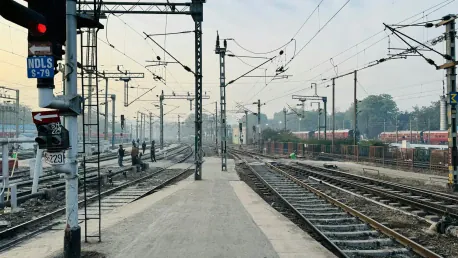As the ongoing conflict with Ukraine continues to intensify, Russia is faced with the critical challenge of ensuring the security of its vast railway infrastructure. Throughout the war, railways have played a crucial role in transporting military supplies and personnel, making them prime targets for Ukrainian strikes. To address this pressing issue, Russia has outlined a comprehensive plan to enhance the security and operational efficiency of its rail network amidst the dual pressures of war and Western sanctions.
Strengthening Legislative and Strategic Frameworks
To bolster the security of its railways, Russia plans to refine its legislative and strategic frameworks.
Legislative Refinements
An important aspect of Russia’s security overhaul includes updating and streamlining its legislative processes. By reducing redundancy in current laws, the government aims to ensure swift and effective responses to any emerging threats to railway infrastructure. The goal is to cut through bureaucratic red tape, allowing for faster implementation of security measures and rapid mobilization of resources.
Alongside legislative amendments, Russia is working on the formation of a new national transport security plan. This plan will lay out a detailed strategy to safeguard the country’s transport systems against various threats, with a particular focus on railway security. The government aims to mobilize essential resources and coordinate efforts across different agencies to create a robust and responsive security apparatus.
Countermeasures Against Sanctions
The impact of Western sanctions on Russia’s railway security cannot be understated. Sanctions have led to significant shortages in critical equipment, much of which was previously imported from Western countries. This includes essential inspection and screening technologies necessary for ensuring the safety of the railways. As a consequence, Russia faces considerable challenges in maintaining and supporting existing foreign equipment due to restricted access to spare parts and technical support.
To counter these challenges, Russia is exploring domestic production of the required technologies. This includes the development and manufacturing of anti-drone equipment and other critical security apparatus. However, the transition to self-reliance is a time-consuming process, with implementation expected to take around 2-3 years. In the interim, the country must find workaround solutions to maintain its railway security.
Technological Acquisitions and Workforce Challenges
Anti-Drone Equipment and Rapid Response Teams
Technology plays a critical role in the security enhancements planned by Russia. One key acquisition is anti-drone equipment, which is essential for protecting critical railway infrastructure from potential aerial attacks. These acquisitions will help fortify the railways against increasingly sophisticated threats and ensure continuous operation even under adverse conditions.
In addition to technological upgrades, Russia also plans to deploy rapid response teams and establish 24/7 duty services. These teams are trained to respond swiftly to any security incidents on the railways, ensuring immediate action is taken to mitigate threats. The establishment of round-the-clock duty services ensures constant vigilance and a ready state of defense, crucial for maintaining the integrity of railway operations.
Workforce Shortages and Mobilization
One of the significant obstacles in enhancing railway security is the mobilization of skilled railway workers for the war effort. This mobilization has led to a noticeable shortage of qualified personnel to maintain and operate the railway infrastructure. The absence of these key workers further complicates the task of implementing new security measures and maintaining existing systems.
To mitigate this issue, Russia is exploring ways to streamline training programs and quickly prepare new personnel to fill the gaps. This includes accelerated training courses and the deployment of experienced workers from other sectors to the railway industry. However, the loss of highly skilled workers to the conflict remains a considerable challenge, necessitating innovative solutions to maintain the continuity of railway operations and security.
The Road Ahead
Amid the escalating conflict with Ukraine, Russia faces the critical challenge of safeguarding its extensive railway infrastructure. Throughout the war, these railways have been pivotal in ferrying military supplies and personnel, making them prime targets for Ukrainian attacks. Recognizing the importance of this network, Russia has developed an elaborate strategy to bolster the security and operational efficiency of its railways, all while contending with the dual pressures of warfare and Western sanctions imposed upon it. This strategic plan aims to protect the critical transport routes essential for Russia’s military logistics to ensure they remain functional and efficient under the strain of ongoing conflict. Enhancing railway security is vital for maintaining uninterrupted logistical support, given the key role these routes play in the movement of Russian troops and supplies. Therefore, securing these transport arteries is not just an operational necessity but a strategic imperative for Russia amid the multifaceted challenges it presently confronts.









